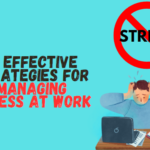Introduction
Work-related stress is a prevalent issue that affects employees and managers across all industries. Managing stress at the workplace is essential to ensure a healthy and productive work environment. Work-related pressure can lead to burnout, low morale, decreased productivity, and physical & mental health problems which can affect your employee productivity significantly. Thus, it is crucial for both employees & managers to understand the importance of managing work-related stress & implement effective strategies to reduce stress levels in the workplace.
In today’s fast-paced work environment, employees are expected to manage heavy workloads, tight deadlines to satisfy clients and a constant demand for increased productivity.
This can create a stressful work environment, making it challenging to maintain work-life balance and well-being. Moreover, managers have the responsibility to ensure their team’s success while managing their own stress levels. This can be an extremely hard task to manage, as managers must balance employee satisfaction & productivity with business objectives and profit margins.
This blog aims to provide employees & managers with effective strategies for managing stress at the office. By implementing these tips mentioned here, individuals can improve their well-being and overall work performance, creating a positive work environment.
Top 5 Strategies for employees for managing stress at the workplace
1. Prioritizing workload
One of the main sources of work-related stress is an overwhelming workload. To manage this stressor, employees should prioritize their tasks based on urgency & importance. By creating a to-do list and breaking down tasks into smaller, manageable steps, employees can avoid feeling overwhelmed by their workload and maintain a healthy work-life balance.
2. Time management
Effective time management at your workplace is crucial for managing work-related mental pressure. By setting realistic deadlines, avoiding multiple works at the same time, & scheduling breaks to free up minds, employees can reduce stress levels and increase productivity. Employees should also consider delegating tasks and saying no to unrealistic requests from their seniors to manage their workload effectively.
3. Regular breaks
Taking frequent breaks throughout the day at the office is crucial for managing stress at the office. Short breaks, such as taking a walk or stretching & deep breathing, can improve focus & work productivity while reducing mental stress levels. Employees should also take longer breaks, such as a lunch break and short walk around the office campus, to recharge & prevent burnout.
4. Frequent Communication with managers
Open communication with managers can help employees manage work pressure. Employees should feel comfortable discussing their workload & stress levels with their senior or team leaders, as this can lead to a more manageable workload and increased support.
5. Exercise and physical activity at the workplace
Regular exercise & physical activity at the workplace can reduce stress levels, improve mood, and increase productivity at work. Employees can incorporate physical activity like weight lifting at the workplace or by taking a walk during their break or participating in a fitness program.
Top 5 tips for managers to help employees manage work-related stress at the workplace
1. Open communication & taking regular feedback from all employees
Managers should establish an open communication culture at the workplace, where employees feel comfortable discussing their workload & stress levels. This can lead to more manageable stress management & increased support for employees. Additionally, managers should provide regular feedback on employee performance, ensuring clear expectations and achievable goals.
2. Flexibility and work-life balance
Managers should encourage work-life balance & provide flexibility to all employees. This can include flexible working hours, work from home, and paid leave. By supporting employee well-being, managers can reduce stress levels and increase employee satisfaction and productivity.
3. Clear expectations and manageable workloads
Clear expectations & manageable workloads are crucial for reducing stress at the workplace. Managers should establish clear objectives & provide team members with the necessary resources to achieve their goals and deadlines. Additionally, managers should monitor employee work pressure and provide support to avoid overload and burnout.
4. Support for employee career development
Managers and team leaders should provide freedom to employees for career development, such as proper training and mentoring. By investing in employee career growth and development, managers can increase job satisfaction and reduce stress at the office.
5. Encouragement of self-care
Managers should encourage mindfulness and provide resources for employee well-being, such as mental health support & fitness programs alongside their package. By prioritizing employee health and well-being, managers can create a positive work environment and increase employee engagement & work productivity.
Conclusion
In today’s fast-paced work environment, work-related stress is a common issue for employees, managers, and team leaders. However, by implementing the effective strategies mentioned in this blog, managing workplace stress can be easy for everyone in the office. If you still struggling to manage stress at the office you always contact a professional for Corporate Stress Management. If you are based in Kolkata and looking to avail of these mental health services and the best Psychiatrist treatment in Kolkata, Moner Alo is the best place for you. To know more, please call us!!
Strategies for managing work-related stress include
- Prioritizing workload
- Effective time management
- Taking regular breaks
- Open communication
- Exercise & physical activity
- Mindfulness and relaxation techniques
- Flexibility, clear expectations
- Support for employee development.

